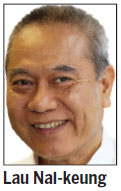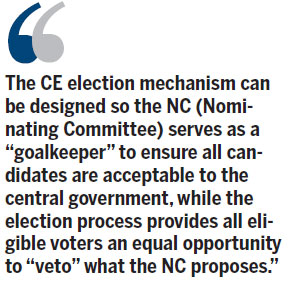Voters' veto power key to CE election by universal suffrage
Updated: 2014-02-11 07:00
By Lau Nai-keung(HK Edition)
|
|||||||
On Jan 29, Secretary for Justice Yuen Kwok-keung wrote an article in order to "provide the community with certain ideas for reference" to the controversial issues of civic nomination and nomination by political parties. The timing of the article was excellent because "unfettered" public discussion on constitutional development has been going on for a couple of months. Hong Kong is in urgent need of advice from the government about what future political arrangements can be allowed under the Basic Law.
Overall, Yuen's contention that both "civil nomination" and "party nomination" were inconsistent with the Basic Law was expressed well. In saying that "the government has always stressed that any proposal bypassing the nomination procedures of the Nominating Committee (NC) or undermining its substantive nomination power might be inconsistent with the Basic Law," Yuen also openly admitted that the government had contributed to the current state of confusion. If such proposals "might be inconsistent" with the Basic Law then logically they also "might be" consistent with the Basic Law. This is the view taken by Civic Party and Hong Kong 2020 - which Yuen now seeks to dismiss.
While we should applaud Yuen for standing firm against erroneous interpretations of the Basic Law, we must also propose creative solutions within acceptable perimeters to avoid a constitutional deadlock.
The central government has made it clear that its main priorities are national security and a suitable Chief Executive (CE), and it is going to insist on its constitutional rights to attain these priorities. At the same time, the dissidents are pushing for "true universal suffrage", which they define as unrestrained democracy void of influence from the central government. As the debate is now framed, there is really little room for compromise.

In view of this seemingly unsolvable conflict between the central government and the dissidents, any chance of a deal would come from a direct dialogue between the HKSAR Government and the Hong Kong people.
What people in Hong Kong really want is simple. We want to be able to vote for a person we believe will be a competent leader. We don't need an infinite number of choices, but we want real choices, and real choices need not necessary involve dissident candidates. Frankly, I can't see any capable dissident candidates on the horizon.
If we truly address this legitimate concern, then we can do it without bothering too much about the nomination process. The CE election mechanism can be designed so the NC serves as a "goalkeeper" to ensure all candidates are acceptable to the central government, while the election process provides all eligible voters an equal opportunity to "veto" what the NC proposes.
Such a system will ensure that the candidate returned has the blessings of both the central government and the Hong Kong people, and fundamentally resolve the "dual accountability" tensions inherent in our constitutional arrangements.

The "veto" mechanism can be realized by a variety of means, such as a requirement of a minimum voter turnout, or that the CE candidate must receive a certain percentage of overall votes, or a combination of both. All are allowed by the Basic Law.
Such a veto "mechanism" will invariably increase uncertainty and cost, as there is a real chance that voters can boycott all candidates proposed by the NC, and multiple voting sessions have to be held. But at the same time, it will provide added incentives for the NC to come up with a list of candidates to our liking. All the extra trouble is worth taking, if it results in a CE with a genuine mandate to govern Hong Kong effectively.
With a bottom line in the nomination process and substantive appointment rights, the central government has already hedged its bets. Providing Hongkongers with a genuine veto power sends citizens a clear message that the "dual accountability" towards both the central government and the people in Hong Kong is guaranteed institutionally.
The author is a veteran current affairs commentator.
(HK Edition 02/11/2014 page9)